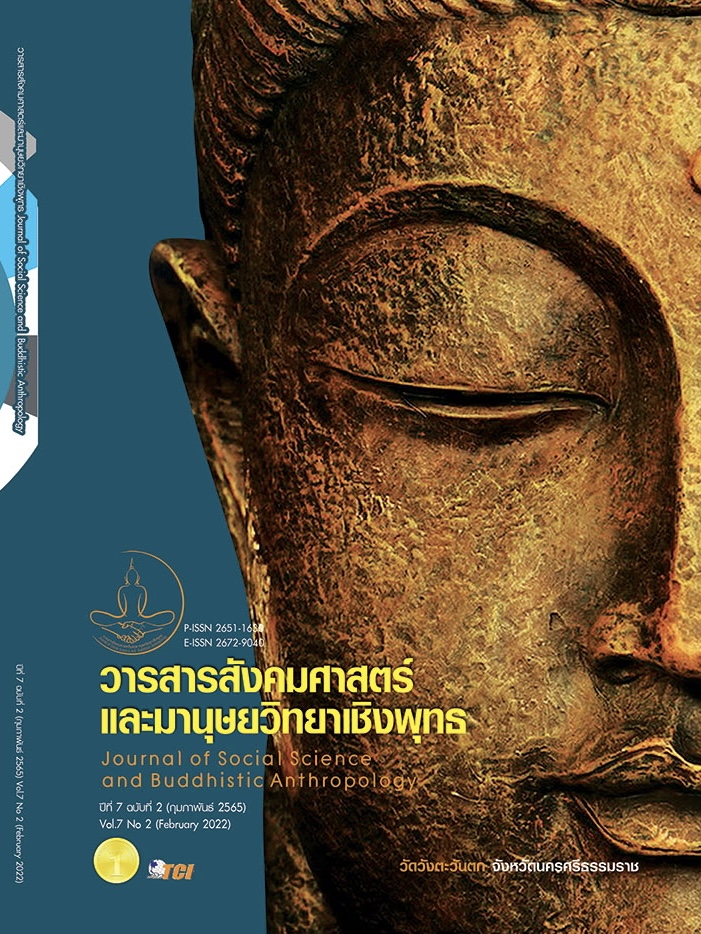COMPONENTS OF COMPETENCE IN ORGANIC RICE SMART FARMER IN THAILAND
Keywords:
Competency, Components of Competence, Smart Farmer, organic rice smart farmer competencyAbstract
The Objectives of this research article were to 1) identify organic rice smart farmer competencies and 2) develop the components of competence in organic rice smart farmer. Mixed method methodology was applied to conduct the studies. The qualitative research was used to identify organic rice smart farmer competencies via in-depth interview and observation with 9 interviewees, where organic rice entrepreneurs have been received the national award. Interviewees selected by purposive sampling technique, then the result was used to identify the components of competence in quantitative research. The data collected with 600 samples, and analyzed via exploratory factor analysis technique, rotating axis with equamax technique. The result found that there were 30 competencies to be an organic rice smart farmer including Information and technology, Financial, Accounting, Organic standard management, Land management, Marketing, Organic rice cultivation, Networking management, Presentation, Production planning management, Water management, Leadership, Innovative problem solving, Knowledge transferring, Seeding selection, Pest and disease control, Agriculture mechanical and technology usage ability, Innovator, Soil analysis and development, Farm management, Research, Communication device usage ability, Legal and policies, Labor management, Production resource management, Logistic and transportation, Power management, Grain management, International language, and Perceived value. The components of competence in organic rice smart farmer consisted of 1) Innovation information technology and communication consisted of 10 competencies, 2) Sociological organic rice cultivation consisted of 8 competencies, 3) environment and ecosystem consisted of 6 competencies, and 4) Organization management consisted of 6 competencies.
References
กรมส่งเสริมสหกรณ์. (2563). บุคคล/สหกรณ์/กลุ่มเกษตรกรดีเด่น. เรียกใช้เมื่อ 12 กุมภาพันธ์ 2563 จาก https://www.cpd.go.th/cpdth2560/information-cpd/person-coop
กระทรวงเกษตรและสหกรณ์. (2559). ยุทธศาสตร์เกษตรและสหกรณ์ ระยะ 20 ปี (พ.ศ. 2560-2579). เรียกใช้เมื่อ 12 กุมภาพันธ์ 2563 จาก https://www.opsmoac.go.th /strategic-files-401191791792
กลุ่มควบคุมและรับรองมาตรฐานข้าว กองตรวจสอบรับรองมาตรฐานข้าวและผลิตภัณฑ์ กรมการข้าว. (2563). สรุปผลการทบทวนการตรวจประเมินกลุ่มเกษตรกรอินทรีย์ล้านไร่สำหรับการตรวจรับรองมาตรฐานข้าว ORG (T2 T3) ปี 62/63. เรียกใช้เมื่อ 12 กุมภาพันธ์ 2563 จาก https://www.ricethailand.go.th /ricemarket/images /PDF/29-5-63/organic62_T3.pdf
กัลยา วานิชย์บัญชา. (2017). การใช้ SPSS for windows ในการวิเคราะห์ข้อมูล (ฉบับปรับปรุง) : ภาควิชาสถิติ คณะพาณิชยศาสตร์และการบัญชี. กรุงเทพมหานคร: จุฬาลงกรณ์มหาวิทยาลัย.
เจษฎา นกน้อยและสัญชัย ลั้งแท้กุล. (2016). การจัดการโซ่อุปทานและโลจิสติกส์อุตสาหกรรมการผลิตข้าวสังข์ หยดเมืองพัทลุง ระดับขั้นเกษตรกรและกลุ่มวิสาหกิจแปรรูป. Journal of Community Development and Life Quality, 4(1), 32-44.
เชษฐกานต์ เหล่าสุนทร. (2017). แนวทางการพัฒนาศักยภาพชาวนาในการปลูกข้าวอินทรีย์วิถีธรรมในจังหวัด เชียงราย. Journal of MCU Social Development (JMSD), 2(3), 16-28.
ดาราวรรณ ญาณะนันท์และสถาพร จะนุ. (2020). การพัฒนาเว็บแอปพลิเคชันสำหรับวางแผนการผลิตและการตลาดเพื่อพัฒนาเกษตรกรผู้ปลูกสับปะรดจังหวัดราชบุรีสู่การเป็น Smart Farmer. Journal of Kanchanaburi Rajbhat , 9(2), 202-217.
ธนากร แสงสง่าและธาร ทิพย์รัตนะ. (2018). การประเมินศักยภาพการผลิตข้าวอินทรีย์ของเกษตรกร กรณี ศึกษาตำบลกระเบื้องใหญ่ อำเภอพิมาย จังหวัดนครราชสีมา. วารสารวิชาการมหาวิททยาลัยราชภัฎอุตรดิตถ์, 13(2), 53-63.
สำนักงานคณะกรรมการพัฒนาการเศรษฐกิจและสังคมแห่งชาติ. (2017). แผนพัฒนาเศรษฐกิจและสังคมแห่งชาติ ฉบับที่ 12 (พ. ศ. 2560-2564). เรียกใช้เมื่อ 12 กุมภาพันธ์ 2563 จาก https://www.nesdc.go.th/ ewt_dl_link.php?nid=6422
สำนักงานศูนย์วิจัยและให้คำปรึกษาแห่งมหาวิทยาลัยธรรมศาสตร์. (2563). บทสรุปสำหรับผู้บริหาร (Executive Summary) โครงการประยุกต์ใช้ Blockchain ยกระดับเศรษฐกิจการค้า. เรียกใช้เมื่อ 1 กรกฎาคม 2564 จาก https://www.tracethai. com/executive_summary_th.pdf
สำนักงานสถิติแห่งชาติ. (2563). จำนวนและสัดส่วนประชากรจากการทะเบียน จำแนกตามกลุ่มอายุ (วัยเด็ก วัยแรงงาน วัยสูงอายุ) เพศ ภาค และจังหวัดพ.ศ. 2554 - 2563. เรียกใช้เมื่อ 1 กรกฎาคม 2564 จาก http://statbbi.nso.go.th/staticreport /page/sector/th/01.aspx
สำนักวิจัยเศรษฐกิจการเกษตร และกองนโยบายและแผนพัฒนาการเกษตร. (2563). เกษตรฯ พร้อมมาตรการขับเคลื่อน มั่นใจ ช่วยรักษาระดับรายได้ครัวเรือนเกษตรกร. เรียกใช้เมื่อ 1 กรกฎาคม 2564 จาก https://www.oae.go.th/view/1.
เสงี่ยม กอนไธสงและคณะ. (2011). ระบบการจัดการเรียนรู้การผลิตข้าวอินทรีย์ของศูนย์เรียนรู้ปราชญ์ชาวบ้านในจังหวัดสุรินทร์. KKU Research Journal (Graduate Studies), 11(1), 1-10.
Barragán-Sánchez, R. et al. (2020). Teaching Digital Competence and Eco-Responsible Use of Technologies: Development and Validation of a Scale. Sustainability, 12(18), 7721.
Jhuria, M. et al. (2013). Image processing for smart farming: Detection of disease and fruit grading. In Paper presented at the Image Information Processing IEEE . Second International Conference on Image Information Processing.
Kerdnoi, T. et al. (2014). The struggle of organic rice in Thailand: a multi–level perspective of barriers and opportunities for up scaling. Environment and Natural Resources Journal, 12(1), 95-115.
Lans, T. et al. (2009). Entrepreneurial learning in a changing agri-food sector : towards a taxonomy of relevant learning
activities. In Paper presented at the 19th European Seminar on Extension Education. European Seminar.
Noireaux, V. & Edzengte, J. (2020). The benefits of the digital supply chain for horizontal resource pooling–the case of the Bio Loire Océan Farmers’ Association. Paper presented at the Supply Chain Forum: An International Journal, 21(3), 196-205.
Nunnally, J. & Bernstein, I. (1994). Psychometric theory. New York: McGraw Hill.
Orlando, F. et al. (2020). Participatory approach for developing knowledge on organic rice farming: Management strategies and
productive performance. Newyork: Agricultural Systems.
Punchi, L. (2001). Resistance towards the language of globalisation–The case of Sri Lanka. International review of education, 47(3), 361-378.
Razavi, S. H. et al. (2017). A proposed model for organic rice farming in rural areas of Guilan and Mazandaran Provinces. Journal of Rural Research, 8(3), 372-387.
Sakagami, N. et al. (2016). Characteristics of Elemental Composition and Organic Component of Indonesian Rice: Examples of Several Products in Indonesia Including Organic Rice. Tropical Agriculture and Development, 60(2), 65-70.
Setboonsarng, S. et al. (2006). Contract farming and poverty reduction: The case of organic rice contract farming in Thailand. New York: Poverty Strategies in Asia.
Widjajanto, D. W. (2020). Characteristics of organic rice cultivation of farmer groups at Gajah sub-district, Demak district, Central Java Province, Indonesia. In IOP Conference Series: Earth and Environmental Science. Earth and Environmental Science.
Downloads
Published
How to Cite
Issue
Section
License
Copyright (c) 2022 Journal of Social Science and Buddhistic Anthropology

This work is licensed under a Creative Commons Attribution-NonCommercial-NoDerivatives 4.0 International License.









